Why Group Counseling Helps with Building Long-Term Recovery Goals

Building Foundations for Long-Term Sobriety
Long-term recovery from addiction is a complex journey that benefits greatly from structured support systems. Group counseling stands out as a vital component, offering peer support, accountability, and a sense of belonging that can enhance individual efforts to sustain sobriety. By understanding how group therapy functions and its diverse formats, individuals can better appreciate its role in establishing resilient recovery pathways.
The Role of Group Therapy in Addiction Recovery
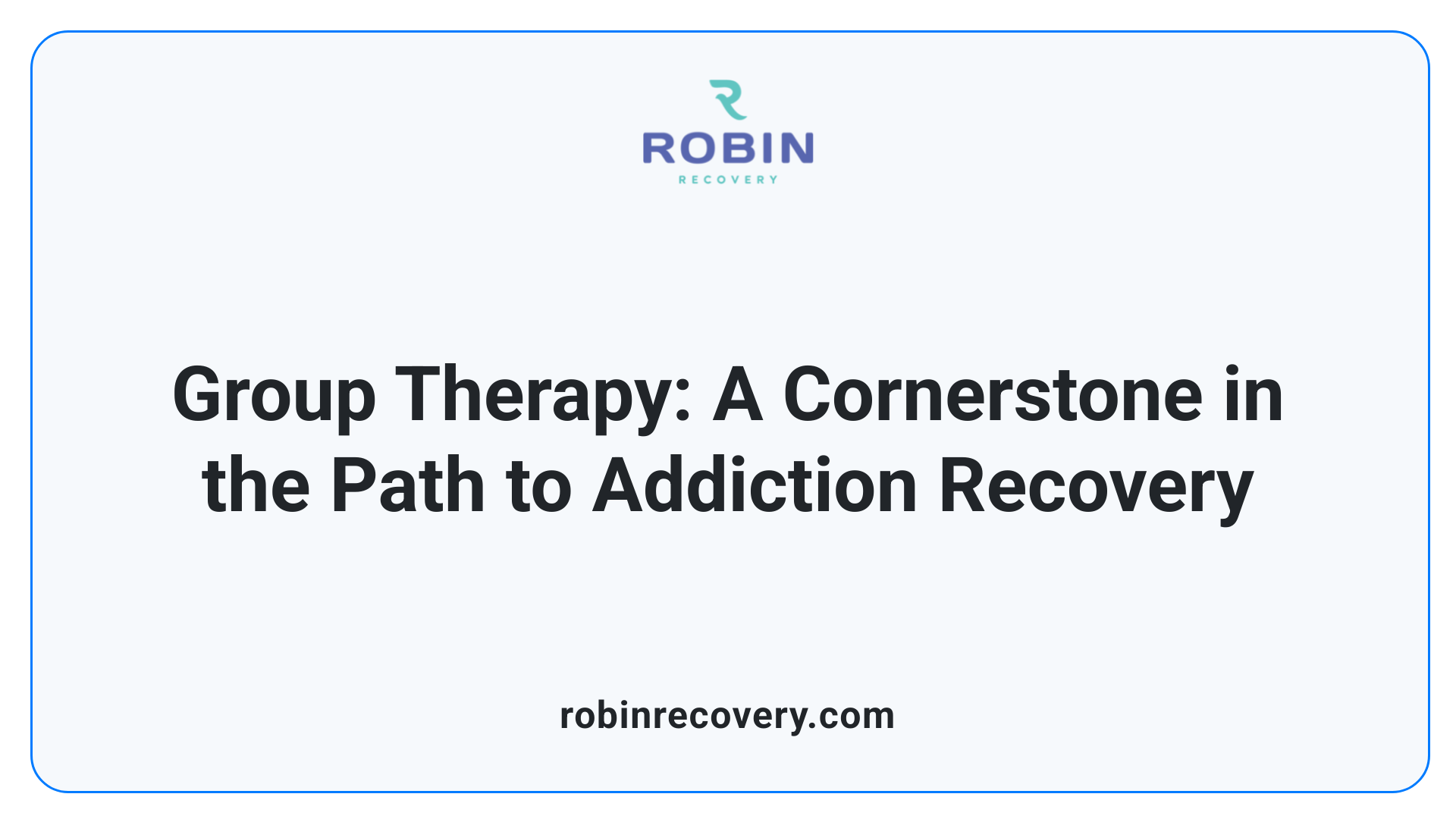
What is a major benefit of group therapy?
A major benefit of group therapy is that it creates a safe, supportive environment where individuals in recovery feel understood and less alone. Sharing experiences with others who face similar challenges fosters a sense of community and belonging, which is crucial for long-term sobriety.
Group therapy exposes participants to different perspectives, coping strategies, and insights that can broaden their understanding of their own behaviors and triggers. This shared space encourages honest communication, helping individuals develop social skills such as active listening, empathy, and assertiveness.
The collaborative nature of group therapy also boosts motivation and accountability among members. When they see peers making progress, it inspires them to stay committed to their recovery goals. This environment facilitates emotional healing, personal growth, and better social functioning, all essential elements in overcoming addiction.
Facilitated by trained therapists, sessions incorporate evidence-based approaches like cognitive-behavioral therapy (CBT) and mindfulness techniques. These methods help individuals develop practical skills to manage cravings, handle setbacks, and build resilience. Overall, group therapy not only supports emotional well-being but also reinforces positive behavioral changes vital for sustaining sobriety.
Supportive environment for sobriety
Group therapy promotes a structured and empathetic setting where individuals can openly explore their struggles without fear of judgment. Such environments cultivate trust and safety, enabling participants to share openly and receive encouragement.
Shared experiences fostering understanding
By listening to others’ stories, members recognize they are not alone in their journey. This shared understanding helps reduce feelings of shame and guilt while reinforcing common goals.
Reduction of shame and feelings of isolation
Addiction often leads to feelings of shame and social withdrawal. Group therapy counters these by fostering a sense of belonging and acceptance, helping individuals reconnect with their social selves and rebuild their confidence.
Facilitation by licensed therapists incorporating evidence-based approaches
A licensed therapist guides each session, ensuring the environment remains supportive and productive. The therapist employs proven methods such as CBT, psychoeducation, and mindfulness exercises to facilitate personal growth and manage emotional challenges.
Overall, the collaborative and professionally guided structure of group therapy plays an essential role in laying the foundation for sustained recovery. It offers ongoing emotional support, valuable skills, and a resilient community that helps individuals maintain their sobriety over the long term.
Mechanisms and Effectiveness of Group Counseling
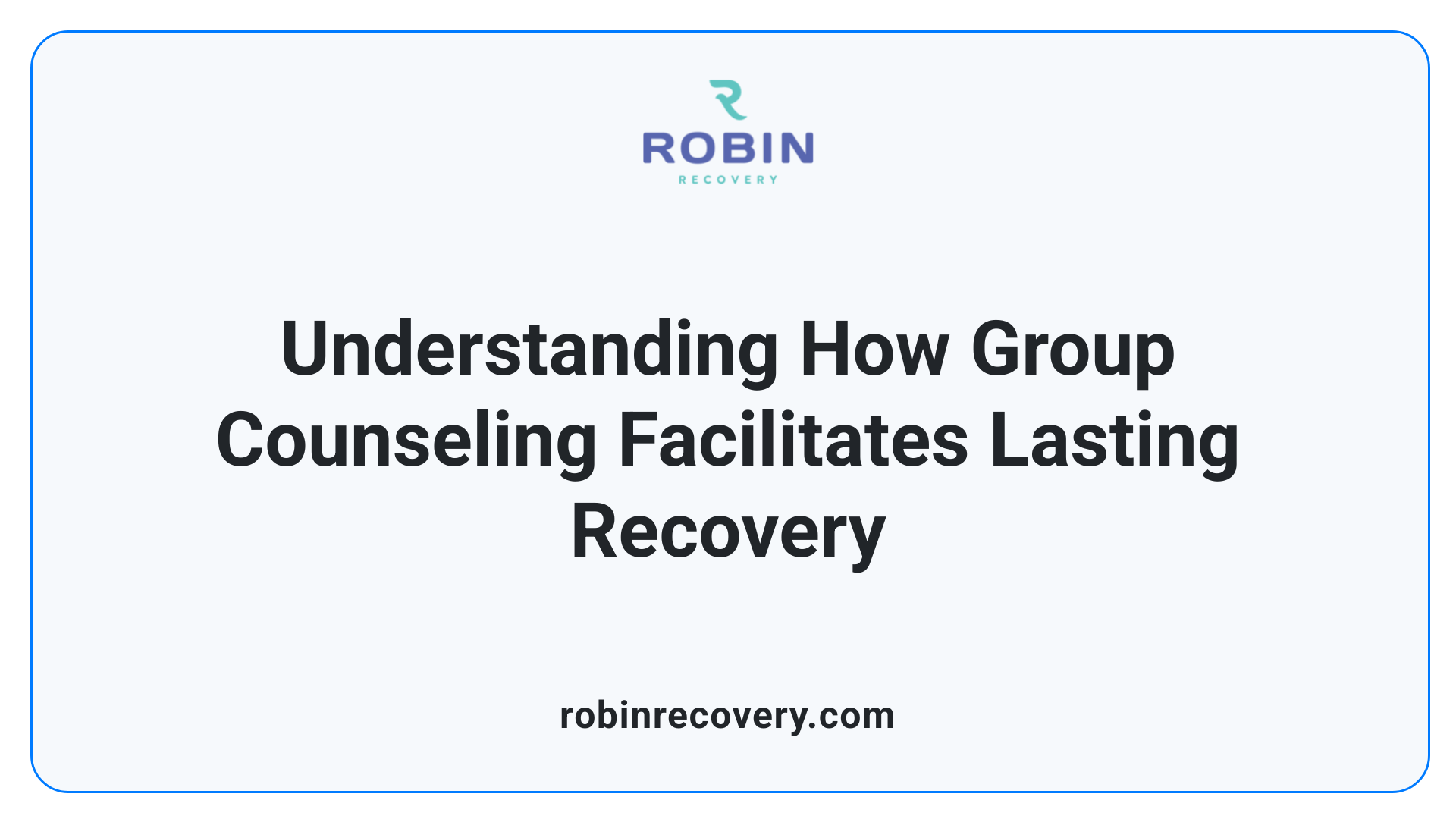
Why are support groups important in recovery?
Research indicates that social support plays a crucial role in addiction recovery. Support groups offer a platform for sharing personal experiences, which can help individuals feel less alone in their journey. These groups provide valuable information, teach new skills, and offer insights that boost confidence. Hearing others’ stories reduces feelings of shame and self-stigmatization, fostering a sense of community and understanding.
Why is team building important in recovery?
Building a sense of team within recovery programs helps re-establish social connections and develop healthy relationships essential for long-term sobriety. Participating in structured group activities creates opportunities to practice communication, empathy, and trust. According to insights from the Ocean Recovery blog, team-based activities elevate self-esteem and reinforce a sense of belonging.
This approach not only combats feelings of isolation common in recovery but also encourages accountability and motivation. Engaging with peers during group sessions offers mutual support, which strengthens resilience and mental health. Overall, team building enhances social stability, making it a vital element in preventing relapse and ensuring sustained recovery.
Sharing experiences to foster understanding and reduce shame
Structured group settings guide participants to openly share their struggles and successes. Hearing diverse perspectives helps individuals recognize patterns in their own behavior and learn from others’ coping strategies. This collective understanding deepens empathy, reduces feelings of shame, and promotes healing.
Setting goals and encouraging accountability
Regular sessions foster accountability, prompting participants to set realistic recovery goals. Peer support encourages honesty about progress and setbacks, creating a motivating environment where individuals stay committed. These shared commitments enhance motivation and provide ongoing encouragement.
Learning coping strategies and managing triggers
Groups serve as learning laboratories for managing triggers, cravings, and setbacks. Participants exchange techniques such as mindfulness, stress management, and effective communication. Practicing these skills in a safe environment prepares individuals to handle real-life challenges, reducing the likelihood of relapse.
Rebuilding social and emotional skills
Recovery often damages social and emotional skills like communication, trust, and empathy. Group therapy provides a safe space to practice and rebuild these abilities. Active listening, expressing emotions, and resolving conflicts are skills reinforced during sessions, supporting long-term personal growth.
Aspect Role in Recovery Notable Benefits Shared experiences Foster understanding and reduce shame Empathy, community feeling Accountability Promote goal setting and commitment Motivation, progress tracking Coping strategies Manage triggers and cravings Resilience, relapse prevention Social skills Rebuild communication, trust Healthy relationships, self-esteem
Joining group therapy creates a lasting support network, provides emotional and practical tools, and nurtures the social skills vital for sustainability in recovery. Overall, these mechanisms demonstrate the profound impact of group counseling in facilitating meaningful and enduring recovery from addiction.
Types of Group Counseling and Their Role in Long-Term Recovery
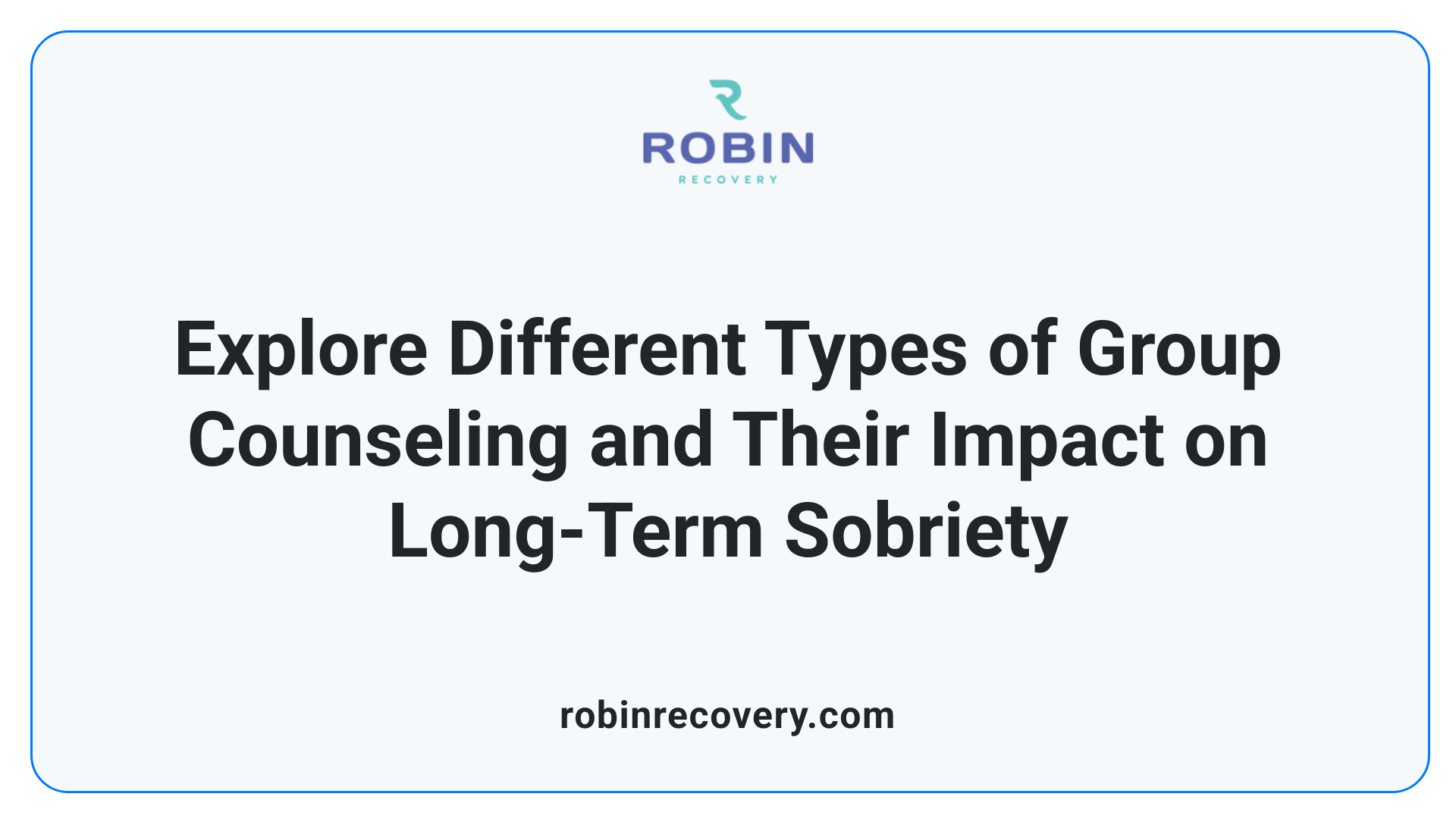
What are support groups, such as Alcoholics Anonymous (AA) or Narcotics Anonymous (NA)?
Support groups like AA and NA are peer-led communities where individuals share their personal stories, challenges, and successes in sobriety. They foster a sense of belonging and accountability, helping members stay committed to their recovery goals. These groups emphasize mutual support, spiritual growth, and practical strategies to maintain abstinence.
How do Cognitive Behavioral Therapy (CBT) groups support recovery?
CBT groups focus on identifying and changing negative thought patterns that may lead to substance use. Led by trained therapists, these sessions teach participants coping skills, problem-solving techniques, and relapse prevention strategies. Engaging in CBT groups helps individuals develop healthier thinking and emotional regulation, which are vital for long-term sobriety.
What is the purpose of psychoeducational groups?
Psychoeducational groups aim to increase knowledge about addiction, its effects, and the recovery process. They cover topics like triggers, coping mechanisms, medication management, and managing relationships. These groups empower individuals with information, helping them make informed decisions and reduce feelings of shame or confusion.
How do skills development groups aid in recovery?
Skills development groups teach practical skills such as stress management, communication, refusal techniques, and emotional regulation. Through role-playing and interactive exercises, participants practice these skills in a supportive environment, boosting confidence and readiness to handle real-life situations without substances.
Why are relapse prevention groups important?
Relapse prevention groups help individuals recognize early warning signs of relapse and develop personalized strategies to address high-risk situations. They often include tools like coping plans, mindfulness practices, and peer support. Regular participation reinforces commitment, resilience, and the ongoing motivation needed for sustained recovery.
How do these group types contribute to long-term sobriety?
Each type of group offers unique support — from emotional encouragement in support groups to practical skill-building in development groups, theoretical understanding in psychoeducational groups, and targeted relapse strategies. Together, they build a comprehensive network of resources, fostering community, accountability, and resilience, which are essential for maintaining long-term recovery.
Group Type Main Focus Benefits Typical Facilitators Support Groups (e.g., AA, NA) Peer support, shared experiences Belonging, accountability, ongoing motivation Peer leaders or members CBT Groups Cognitive and emotional regulation techniques Change negative thinking patterns, relapse prevention Licensed therapists Psychoeducational Groups Knowledge about addiction and recovery Empowerment, informed decision-making, reducing stigma Mental health professionals Skills Development Groups Practical coping and social skills Increased self-efficacy, better emotional management Trained facilitators Relapse Prevention Groups Strategies to avoid relapse Enhanced resilience, personalized plans, ongoing support Clinicians or trained counselors
Participation in these diverse group formats significantly enhances treatment engagement, promotes personal growth, and supports lasting recovery. Building a network of mutual support and ongoing learning creates a strong foundation for individuals to thrive long-term in sobriety.
Building Social Skills and Emotional Resilience
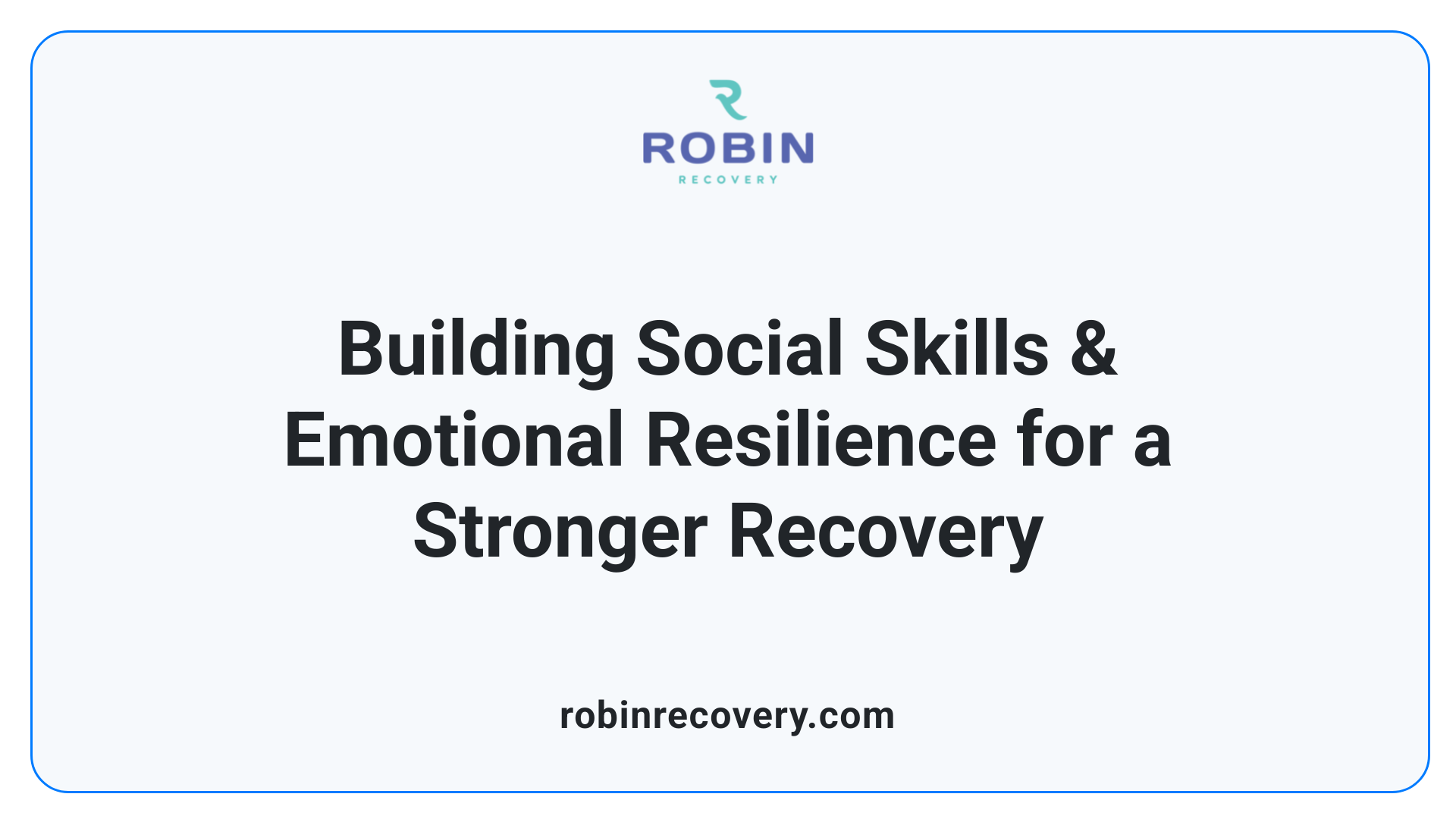
Why is team building important in recovery?
Team building plays a vital role in the recovery process by helping individuals rebuild critical social skills such as communication, empathy, and trust. It offers a safe, supportive environment where participants can practice interacting with others, fostering a sense of community and belonging.
Engaging in group activities enhances emotional regulation and active listening, which are essential for healthy relationships. Such skills contribute to healthier communication, reduce misunderstandings, and build trust among peers.
Moreover, team building helps boost confidence and encourages openness, making it easier for individuals to share their experiences and challenges without fear of judgment. This openness is crucial for healing and personal growth.
According to insights from the Ocean Recovery blog, structured activities like team building not only develop social skills but also reinforce accountability and motivation through shared experiences. These communal efforts help reduce feelings of isolation, which are common during recovery, and foster resilience.
Building social stability through these group-based interactions strengthens the support network essential for maintaining sobriety. It encourages ongoing engagement in recovery, promotes mental well-being, and helps prevent relapse, making team building an indispensable component of long-term addiction recovery.
Supporting Long-Term Sobriety Through Continued Connection and Community
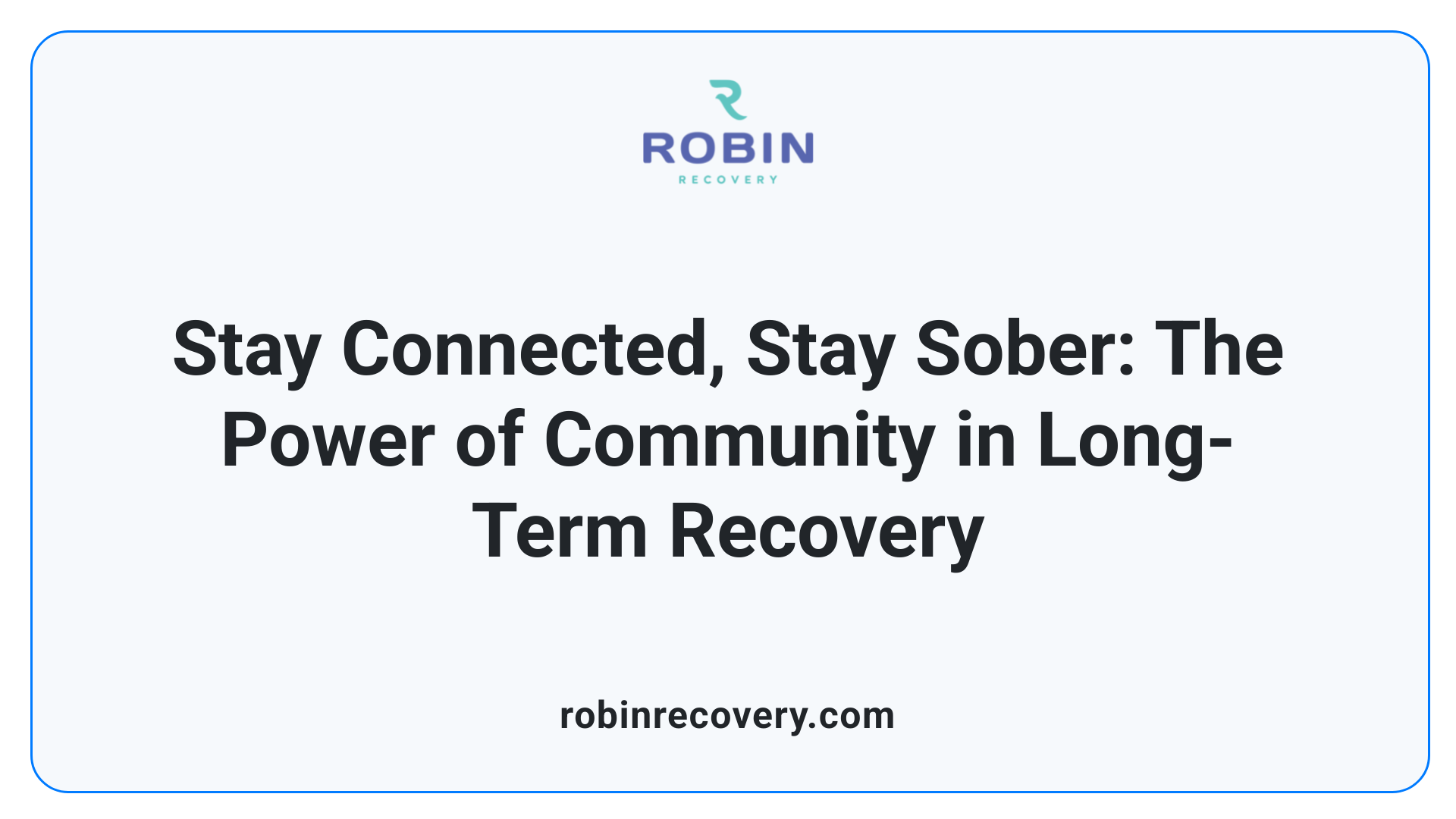
Why support groups are important in recovery?
Research underscores the vital role of social support in the journey toward sobriety. Support groups create a safe environment where individuals share their experiences, learn new coping strategies, and gain confidence through peer encouragement. Sharing stories helps reduce feelings of shame and stigma, making recovery less isolating. These groups often foster a sense of belonging, which is critical in maintaining long-term sobriety.
How does regular participation in group therapy influence recovery outcomes?
Consistent involvement in group therapy reinforces accountability, keeping individuals focused on their recovery goals. Regular sessions provide ongoing emotional support, motivation, and shared learning, which are essential for resilience. The community aspect cultivated through participation helps individuals feel connected and committed, making setbacks less likely. This ongoing engagement builds a robust support network, enabling sustained recovery beyond formal treatment.
Building a support network for enduring recovery
A strong support network developed through group therapy is invaluable. It offers emotional backing, shared resources, and practical advice for handling triggers and setbacks. In addition, the relationships formed often evolve into long-lasting friendships that continue to provide encouragement in everyday life.
Creating a sense of community beyond sessions
Community extends beyond the weekly meetings. Participants often stay connected through social media, informal gatherings, or peer-led activities. This ongoing connection nurtures a sense of belonging and creates a safety net that supports individuals when facing challenges outside structured group settings.
Maintaining motivation and accountability
Motivation can fluctuate, but group settings bolster individuals’ perseverance. Peers celebrate each other's successes and provide reassurance during setbacks, which sustains motivation. Furthermore, shared accountability encourages members to stay committed, set realistic goals, and develop routines that support continuous recovery.
Long-term benefits of group counseling in addiction recovery
Studies highlight that ongoing participation in group therapy can reduce relapse rates, improve mental health, and strengthen social skills. The following table summarizes diverse benefits:
Benefit Description Supporting Evidence Reduced relapse rates Continuous peer support helps individuals stay abstinent. Long-term participation correlates with fewer relapses. Increased self-efficacy Learning from others’ experiences boosts confidence in managing sobriety. Peer feedback fosters belief in personal strength. Enhanced social skills Interaction in groups rebuilds communication and trust. Practice in a safe setting improves relationships. Ongoing motivation Regular encouragement maintains commitment. Peer achievements motivate continued effort. Stronger community bonds Networks formed support long-term recovery. These relationships extend support beyond sessions.
By engaging actively in group therapy and support networks, recovery becomes less of an individual battle and more of a collective journey. Ultimately, thriving in recovery involves building and maintaining these vital communities that support resilience, hope, and lasting sobriety.
The Enduring Power of Collective Support
In conclusion, group counseling is a cornerstone of long-term addiction recovery, offering a multifaceted approach that encompasses emotional support, skill development, accountability, and community building. The diverse formats of group therapy, including support, psychoeducational, CBT, and relapse prevention groups, cater to different needs and stages of recovery. The shared experiences and mutual encouragement within these settings not only foster resilience but also help individuals rebuild social skills and develop healthy routines that sustain sobriety over time. While challenges like stigma and scheduling may arise, the evidence overwhelmingly supports the effectiveness of group therapy as an integral part of comprehensive addiction treatment. Ultimately, the collective strength and ongoing connection cultivated through group counseling form a powerful foundation for lasting sobriety, personal growth, and improved quality of life.
References
- Group Therapy For Long-Term Sobriety
- Why Group Therapy is Key to Addiction Recovery | GBAC
- 7+ Benefits of Group Therapy for Addiction
- Benefits of peer support groups in the treatment of addiction
- Can Group Counseling Really Help You?
- The Benefits of Group Therapy in Substance Abuse ...
- The Power of Group Therapy in Addiction Recovery
- The Importance of Group Therapy Activities
- The Power of Community: Group Therapy and Your Recovery
- The Transformative Power of Group Therapy in Addiction ...
